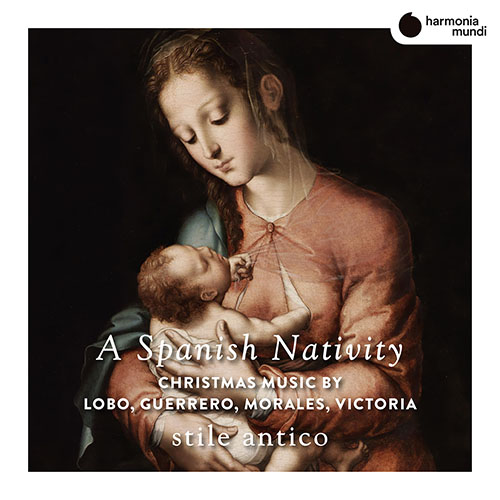
A Spanish Nativity
Stile Antico
Harmonia Mundi 902312
The “Golden Age” of Spanish polyphony (during the sixteenth century) yielded a number of pieces suitable for Christmastime by some of the finest composers of the Renaissance: Tomás Luis de Victoria, Franciso Guerrero, and Cristóbal de Morales. On the a cappella vocal group Stile Antico’s latest disc, A Spanish Nativity, these leading lights are set alongside Alonso Lobo, Mateo Flecha el Viejo, and Pedro Rimonte; all three’s music is worthy of revival.
The dozen singers of Stile Antico create an extraordinarily well-blended sound on Victoria’s great motet “O Magnum Mysterium,” Guerrero’s “Beata Dei genitrix Maria,” and the Lobo mass based upon it. The contrapuntal sections are clearly delineated and the chordal passages are resonant and beautifully tuned. Lobo adeptly parodied the textures of Guerrero’s motet while significantly embellishing the source material. It makes the case for Lobo’s music to be far better known. This appears at least somewhat likely; of late ensembles are making the case both for him and for Mateo Flecha – one is glad to see them having a moment.
Stile Antico is equally adept at the syncopated dance rhythms of Guerrero’s “A un niño llorando,” Rimonte’s “De la piel de sus ovejas,” and Flecha’s “El jubilate” and “Ríu ríu chíu.” The juxtaposition of motet and villancico (a ‘peasant song’) shows the range that Guerrero was able to employ in his work. Flecha was the premiere purveyor of “Ensaladas,” (yes, salads), quodlibets of secular songs that are nearly always about the nativity. Those programmed here are among his most famous Ensaladas.
The recording closes with a beautiful selection, Morale’s motet “Cum natus esset Jesus.” Built around a canon between the alto and soprano, its technical rigor is no impediment to beautifully flowing lines and deftly crafted cadences.
A Spanish Nativity is highly recommended, as is Stile Antico’s other 2019 release, In A Strange Land – Elizabethan Composers in Exile, which features music by recusant Catholic composers during the time of Elizabeth I. The ensemble has had quite a year and one waits expectantly for their next project in the studio – as well as their next concert tour of the United States.
-Christian Carey
